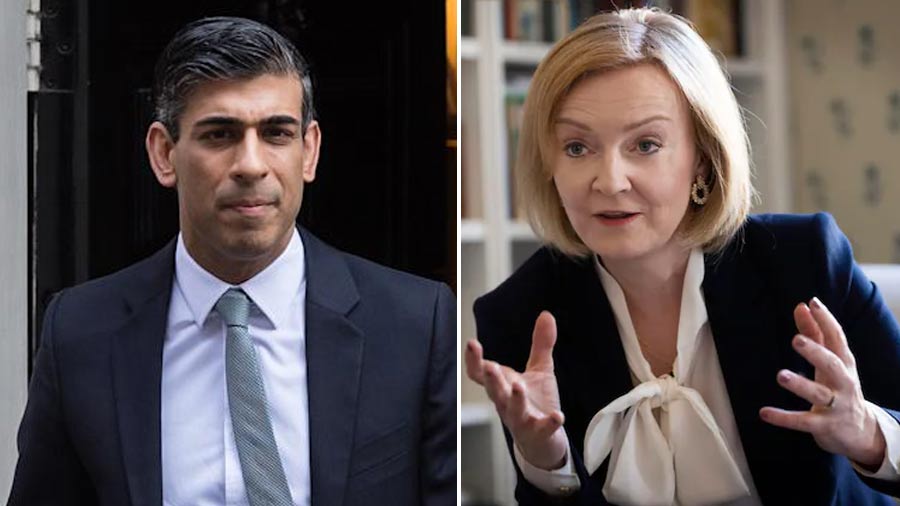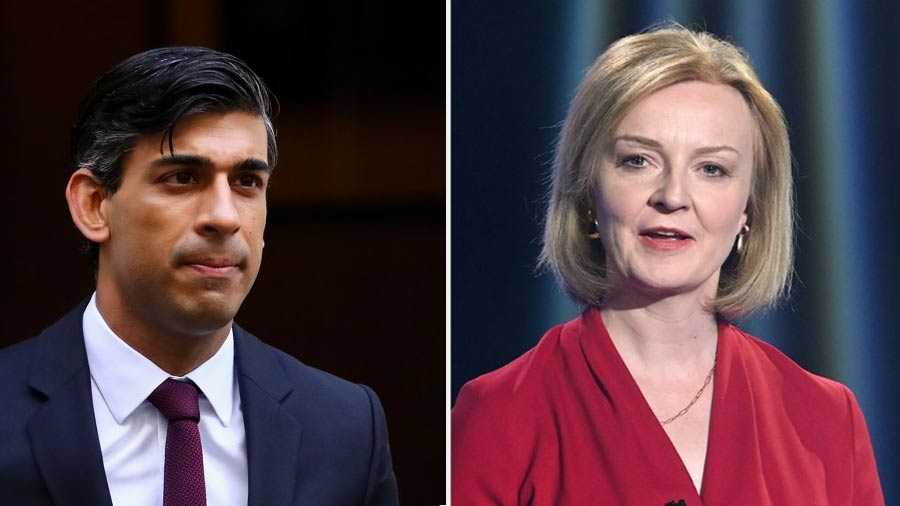Can Rishi Sunak prove wrong the sceptics who said a non-white could never make it to Downing Street? Now only two competitors are left in the contest to be Britain’s next Conservative prime minister. Sunak faces Foreign Secretary Liz Truss who gathered 113 votes in Wednesday’s final voting round by party members. Sunak, who’s been the hot favourite all through the contest was far in front of Truss with 137 votes – though possibly not as far in front as he would have liked to be.
The great question now: he’s favoured by Conservative MPs but will his charms work on the 160,000 party members around the country who will now have the final say in this contest? Many view Truss, who has come out with belligerent statements on Ukraine and has promised to lower taxes, as the person they’d like in charge. In Westminster she’s seen differently. Detractors deride her as a "human hand-grenade" and a political lightweight.
Sunak’s still hugely liked by political commentators in Westminster but the bookies are increasing the odds against him winning. Yes, that’s partly because he’s visibly non-white but it’s more because he’s refusing to cut taxes because it would be fiscally irresponsible and that his resignation finally brought down Prime Minister Boris Johnson – an act of treachery according to many of the rank-and-file Conservative members. The populist Truss is pitching herself as the Boris “continuity candidate” who wants to increase spending and lower taxes.
Whichever way the race goes, the fact that Sunak’s on the final ballot has shown how British attitudes to non-white minorities have changed. Says columnist and former Daily Telegraph editor Charles Moore about Sunak: “He is a thoroughly respectable, pleasant, intelligent, well-educated person with nothing known against him except the problem of his wife’s non-dom status, a political but not an ethical error.” Tellingly, Moore called Sunak, “the establishment candidate”.
Half of the initial 10 Conservatives seen as contenders for the party leadership were from ethnic minority backgrounds. The right-wing Spectator magazine remarked, with a tinge of pride: “The Tories are showing Labour how it’s done on diversity.”
For a closer understanding of how much the landscape has altered for non-white politicians, consider the almost unknown first-time Bangladeshi-origin MP Rehman Chishti. With remarkable confidence, Chishti entered the race and had many political pundits rapidly Googling his name to find out who on earth he was. Chishti’s race was cut short when he failed to get any backers. But he had raised his own profile and also shown just how confident ethnic candidates have become about seeking to make their way to the forefront in Britain.
Says Chishti: “If you think you have what it takes, and you have something to offer, then you have to put yourself forward, and you have to have a vision and let others judge if that’s the right vision.”
All this is an enormous change from the not-too-distant past. Former MP Keith Vaz has vivid memories of being the first Indian to make it to the House of Commons in the 1980s (if we don’t count Dadabhai Naoroji, an anti-imperialist of global reknown who entered Parliament in 1892). Today there are almost 40 non-white MPs in the different parties.
Most are from Indian, Pakistani and Bangladeshi backgrounds but there are others like Nigerian-origin Kemi Badenoch, who was the fourth runner-up and was edged out of the race to be prime minister on Tuesday. Badenoch, a persuasive speaker who is to the extreme right of the party, could be the biggest winner of the battle to be prime minister because she’s also a virtual newcomer to the world of politics and is certain of a plum Cabinet job in the next government, no matter who wins.
Another candidate who bowed out of the prime ministerial race was Kurdish-origin Nadhim Zahawi who entered the fray with high hopes but was knocked out earlier than expected. Zahawi blotted his political copybook with party faithful by accepting the top job as chancellor of the exchequer one morning and telling Johnson to resign by evening.
Others who were also knocked off the political chessboard early include Goan-origin Suella Braverman, another political novice with huge ambitions who used her position as attorney general in the Johnson government to build her own image. She oozed assurance till the end but came last in the fourth round with only 27 votes – down from her best performance with 32 votes in the round before.
Then, another non-white politician who made news by not standing for election was Home Secretary Priti Patel, an immigration hardliner who caused a surprise by staying out of the race. And former health secretary Sajid Javid was eliminated from the contest surprisingly early. Keep in mind the fact that Sunak, Patel and Javid held the senior-most jobs in the Johnson government – treasury, home and health.
The man who did most to bring Asians into the higher echelons of politics was former prime minister David Cameron. He tells how he looked round his cabinet table and saw only white males on all sides of him. He decided back in 2005 that the Conservative Party had to reflect the diversity present in the wider country. Johnson finished the job by placing an unprecedented number of non-whites in very senior jobs.
Back in 2014, Cameron exuded confidence that a British Asian would take on the top job. “One day, I want to hear that title ‘Prime Minister followed by a British-Asian name,” he said in a speech in London.
What’s surprising for many observers, though, is how right-wing the non-white leadership contenders are. Leading British actor Adil Ray, better known to comedy fans as Citizen Khan tweeted: “I still cannot get my head around the fact that ALL the ethnic minority candidates vying to be PM (had supported) sending (UK) refugees to Rwanda. Not one, but all.”
Now Sunak faces the ultimate test. Can he persuade the Tory rank-and-file to choose him and not Truss who has been voted Conservative activists’ favourite repeatedly? Will older men and the ‘blue rinse’ brigade (as older Conservative women are still derisively called even though they’ve abandoned their blue-tinted hair-colour) vote to elect an Asian-origin prime minister?
But former Conservative leader William Hague counters those with doubts about Sunak. He points out that Sunak took over his constituency Richmond in Yorkshire. The famously dour Yorkshiremen and women of the constituency wanted a white Yorkshire-born candidate. Instead, they got Sunak who was born in Southampton but who charmed his way forward and won the seat for the constituency where less than three per cent of voters were non-white. He held it against other independents and the far-right Ukip who thought he might be easy prey. “They were all routed by Sunak, who turned out to be a highly energetic, bright, emotionally intelligent candidate,” recalled Hague.
Indians should remember one point if Sunak does actually win the race against Truss, seen by her fans as a “true blue Tory.” Yes, politicians like Sunak, Patel, Braverman, Javid and even Chishti have South Asian roots. But they're British through and through and India shouldn't expect any favours from any of them.
The party has clearly come a long way from when the late Conservative party grandee, Norman Tebbit, a senior Tory in Margaret Thatcher’s time, stirred controversy in 1990 by saying British Asians couldn’t be truly loyal to Britain without cheering for the England cricket team. Even Tebbit backed down from that extreme view, though, in later years, calling immigrants natural Conservatives thanks to their entrepreneurial spirit. Says Cross-bench peer Lord (Karan) Bilimoria, the brain behind the popular Cobra beer: “I predicted we would have an Asian as prime minister, when I won the Asian of the Year award in 2003. I think I was the first person to say this.”
No matter who wins, the Conservative leadership race will have demonstrated that the party has made a good fist of embracing ethnic diversity, though, as The Economist noted in the case of public-school educated Sunak, for one, it’s easier to change your class than your race.












